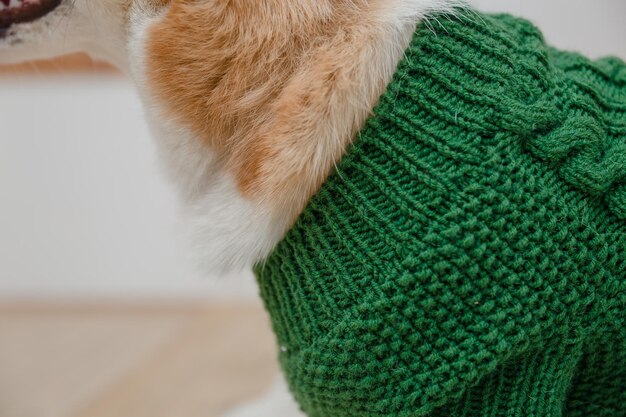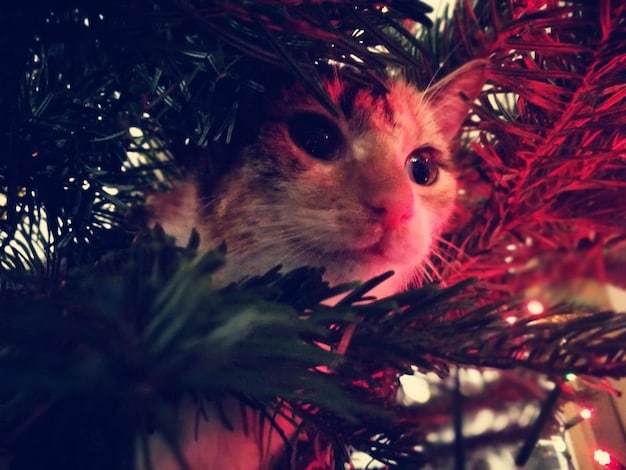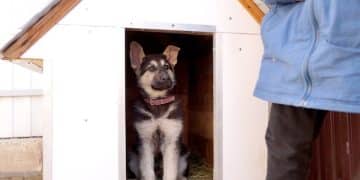Time-Sensitive Alert: Winter Pet Health Hazards in the US

Anúncios
Time-Sensitive Alert: Winter Pet Health Hazards to Watch Out for This Winter highlights critical seasonal dangers, including cold exposure, antifreeze poisoning, and holiday food toxicity, urging pet owners in the US to take proactive measures for their pets’ safety.
As winter’s chill settles across the US, it’s a time-sensitive alert: seasonal pet health hazards to watch out for this winter. From frosty paws to toxic temptations, understanding these risks is the first step in ensuring your furry friends stay safe and sound throughout the colder months.
Anúncios
Understanding the Unique Challenges of Winter for Pets
Winter presents a unique set of challenges for pet owners. The cold weather, combined with holiday-related hazards, can create a perfect storm of potential health risks for our beloved companions. Understanding these challenges is crucial for proactive pet care.
The Impact of Cold Weather on Pets
Exposure to cold weather can lead to hypothermia and frostbite in pets, especially those with short fur or underlying health conditions. Recognizing the signs and taking preventive measures are essential to protect them from the elements.
Anúncios
- Limit outdoor exposure during extreme cold.
- Provide warm bedding and shelter.
- Consider winter coats and booties for sensitive pets.
- Monitor for signs of shivering, lethargy, or pale gums.
Holiday Hazards Abound
The holiday season, while joyful, also brings a host of potential dangers for pets. From toxic foods to hazardous decorations, it’s important to be vigilant and keep these items out of reach.

Keeping a watchful eye during the holidays will reduce your pet of ingesting unsafe items.
In conclusion, winter’s challenges require a proactive approach, combining cold weather protection with vigilance against holiday-related hazards. By understanding these risks, pet owners can ensure a safe and happy winter season for their furry friends.
Antifreeze: A Silent Killer for Pets
Antifreeze, a common winter essential, poses a significant threat to pets due to its sweet taste and extreme toxicity. Even small amounts can cause kidney failure and death if ingested.
The Dangers of Ethylene Glycol
Ethylene glycol, the primary ingredient in most antifreeze products, is highly toxic to pets. It rapidly absorbs into the system, causing irreversible damage to the kidneys.
- Keep antifreeze containers tightly sealed and out of reach.
- Clean up any spills immediately and thoroughly.
- Consider using propylene glycol-based antifreeze, which is less toxic.
- Know the signs of antifreeze poisoning: vomiting, incoordination, excessive thirst, and seizures.
Preventive Measures and Emergency Response
Prevention is key when it comes to antifreeze poisoning. By taking precautions and knowing how to respond in an emergency, you can protect your pet’s life.
Make sure to keep your pets indoors when working with antifreeze. If a spill occurs, clean it up immediately with paper towels. Afterwards, rinse the area with water to remove any residue.
In summary, the dangers of antifreeze cannot be overstated. Vigilance, proper storage, and prompt action in case of exposure are crucial for safeguarding your pet’s health and well-being during the winter months.
Navigating Holiday Food Dangers for Your Furry Friends
The holiday season is filled with delicious food, but many festive treats can be harmful or even fatal to pets. Understanding which foods to avoid and how to prevent accidental ingestion is essential for a safe holiday celebration.

Common Holiday Food Toxins
Several common holiday foods are toxic to pets, including chocolate, grapes and raisins, onions and garlic, and alcohol. Knowing which foods to avoid is the first step in protecting your furry friend.
- Chocolate: Contains theobromine, which is toxic to pets and can cause vomiting, diarrhea, and even death.
- Grapes and Raisins: Can cause kidney failure in dogs.
- Onions and Garlic: Can damage red blood cells and lead to anemia.
- Alcohol: Can cause intoxication, coma, and death.
Safe Alternatives and Responsible Feeding
While many holiday foods are off-limits, there are plenty of safe alternatives you can share with your pets. By being a responsible pet owner, you can ensure they enjoy the festivities without risking their health.
Consider these alternatives if giving our pet a holiday treat:
Offer pet-safe treats or plain cooked meats and vegetables in small amounts. And always keep trash cans securely covered to prevent scavenging.
In conclusion, navigating holiday food dangers requires careful planning and responsible feeding practices. By knowing which foods to avoid and offering safe alternatives, you can ensure a happy and healthy holiday season for your beloved pets.
Protecting Your Pet’s Paws from Winter’s Harshness
Winter weather can be particularly harsh on your pet’s paws. Salt, ice, and snow can cause irritation, cracking, and even chemical burns. Taking steps to protect their paws is essential for their comfort and well-being.
The Impact of Salt and Ice on Paws
Salt and ice can cause significant damage to your pet’s paws. Salt can irritate and dry out paw pads, leading to cracking and discomfort. Ice can cause cuts and abrasions, making it painful for your pet to walk.
Preventive Measures and Paw Care Tips
Protecting your pet’s paws from winter’s harshness requires a combination of preventive measures and regular care. By taking these steps, you can ensure their paws stay healthy and comfortable all winter long.
- Use paw wax or balm to create a protective barrier.
- Consider booties to shield paws from salt and ice.
- Wipe paws with a warm, damp cloth after walks.
In summary, protecting your pet’s paws from winter’s harshness is an essential part of responsible pet ownership. By taking preventive measures and providing regular care, you can help them stay comfortable and pain-free throughout the colder months.
Recognizing and Preventing Respiratory Issues in Winter
Winter weather can exacerbate respiratory issues in pets, especially those with pre-existing conditions. Understanding the risks and taking preventive measures can help keep their airways clear and healthy.
The Link Between Cold Air and Respiratory Problems
Cold, dry air can irritate the respiratory tract, leading to coughing, wheezing, and difficulty breathing. Pets with asthma, bronchitis, or other respiratory conditions are particularly vulnerable.
Creating a Healthy Indoor Environment
Creating a healthy indoor environment can help minimize respiratory issues in pets during the winter months. By taking steps to humidify the air and reduce allergens, you can help keep their airways clear and healthy.
- Use a humidifier to add moisture to the air.
- Regularly vacuum and dust to remove allergens.
- Avoid smoking indoors around pets.
In conclusion, preventing respiratory issues in pets during winter requires a proactive approach. By understanding the risks, creating a healthy indoor environment, and seeking veterinary care when needed, you can help your furry friends breathe easy all season long.
Maintaining Your Pet’s Mental Well-being During Winter
As the days get shorter and colder, it’s important to remember that pets can also experience seasonal affective disorder (SAD) or boredom due to reduced outdoor activity. Maintaining their mental well-being is just as important as their physical health.
The Impact of Reduced Daylight and Activity
Reduced daylight and outdoor activity can lead to boredom, lethargy, and even depression in pets. Recognizing the signs and providing mental stimulation are essential for their overall well-being.
Enrichment Activities and Indoor Fun
Providing enrichment activities and indoor fun can help combat boredom and maintain your pet’s mental well-being during the winter months. Try interactive toys, puzzle feeders, and training sessions to keep them engaged.
- Rotate toys regularly to keep things interesting.
- Hide treats around the house for them to find.
- Teach them new tricks or commands.
In summary, maintaining your pet’s mental well-being during winter is crucial for their overall health and happiness. By recognizing the signs of boredom and providing enrichment activities, you can help them stay engaged and content throughout the colder months.
| Key Point | Brief Description |
|---|---|
| 🥶 Cold Weather Risks | Hypothermia and frostbite are major threats; provide shelter and warm clothing. |
| 🧪 Antifreeze Danger | Highly toxic; keep out of reach. Symptoms include vomiting and incoordination. |
| 🍫 Holiday Food Hazards | Chocolate, grapes, and onions are toxic. Offer pet-safe treats instead. |
| 🐾 Paw Protection | Salt and ice can damage paws; use wax or booties for protection. |
Frequently Asked Questions
▼
Signs of hypothermia include shivering, lethargy, muscle stiffness, and pale gums. If you notice these symptoms, bring your pet indoors and seek veterinary care immediately.
▼
Antifreeze ingestion is a medical emergency. Contact your veterinarian or an animal poison control center immediately. Prompt treatment can significantly improve your pet’s chances of survival.
▼
Safe holiday foods for pets include plain cooked turkey or chicken (without bones or skin), green beans, carrots, and sweet potatoes. Always offer these in moderation.
▼
Use paw wax or booties to create a protective barrier. Wipe paws with a warm, damp cloth after walks to remove salt and ice. Check for cracks or irritation regularly.
▼
Provide interactive toys, puzzle feeders, and training sessions to keep your pet mentally stimulated. Rotate toys regularly to prevent boredom.
Conclusion
Winter can pose significant health hazards for pets, but with awareness and proactive measures, you can ensure their safety and well-being. By understanding the risks, taking preventive steps, and providing a safe and comfortable environment, you can help your furry friends thrive throughout the colder months.






